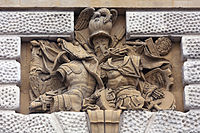You can help expand this article with text translated from the corresponding article in French. (January 2025) Click [show] for important translation instructions.
|
You can help expand this article with text translated from the corresponding article in Spanish. (January 2025) Click [show] for important translation instructions.
|
The Porte du Peyrou is a triumphal arch in Montpellier, in southern France. It is situated at the eastern end of the Jardin de Peyrou, a park near the center of the city.

The arch was designed by François Dorbay, after the model of the Porte Saint-Denis in Paris. Its construction was completed in 1693. Its rusticated surface is crowned by a Doric entablature, suitable to a martial monument. Its later panels in bas-relief and inscriptions glorifying King Louis XIV of France were added in 1715.
These reliefs show four major events from the reign of Louis XIV, rendered as allegories:
- the capture of Namur during the War of the Grand Alliance, in which the figure representing the Dutch Republic kneels before Louis XIV.
- Louis in the figure of Hercules being crowned by Victory.
- the digging of the Canal du Midi that links the Bay of Biscay with the Mediterranean Sea.
- the Revocation of the Edict of Nantes.
Montpellier as seen from the Porte du Peyrou.
-
The Foch avenue as seen from the Porte du Peyrou.
-
The Foch avenue as seen from the Porte du Peyrou.
-
The Peyrou promenade as seen from the Porte du Peyrou.
External links
editWikimedia Commons has media related to Porte du Peyrou.
- Restoration of the arch (in French)
43°36′40″N 3°52′20.5″E / 43.61111°N 3.872361°E










